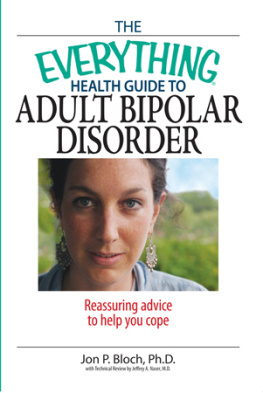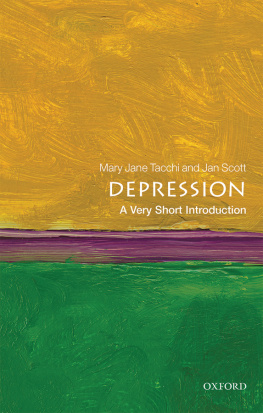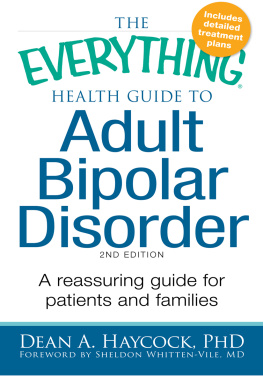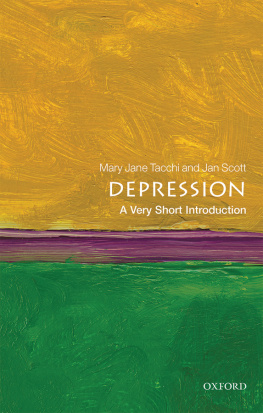When Someone You Know Has Depression

A JOHNS HOPKINS PRESS HEALTH BOOK


When Someone You Know
Has DEPRESSION
Words to Say and Things to Do

Susan J. Noonan, MD, MPH
Foreword by Timothy J. Petersen, PhD,
Jonathan E. Alpert, MD, PhD,
and Andrew A. Nierenberg, MD

Note to the reader: This book is not meant to substitute for medical care of people who have depression or other mental disorders, and treatment should not be based solely on its contents. Instead, treatment must be developed in a dialogue between the individual and his or her physician. My book has been written to help with that dialogue.
If you or someone you know is thinking about suicide, immediately contact your health care provider, go to the nearest Emergency Department, or call 9-1-1.
2016 Johns Hopkins University Press
All rights reserved. Published 2016
Printed in the United States of America on acid-free paper
9 8 7 6 5 4 3 2 1
Johns Hopkins University Press
2715 North Charles Street
Baltimore, Maryland 21218-4363
www.press.jhu.edu
Library of Congress Cataloging-in-Publication Data
Names: Noonan, Susan J., 1953 author.
Title: When someone you know has depression : words to say and things to do / Susan J. Noonan, MD, MPH ; foreword by Timothy J. Petersen, PhD, Jonathan E. Alpert, MD, PhD, and Andrew A. Nierenberg, MD.
Description: Baltimore : Johns Hopkins University Press, 2016. | Series: A Johns Hopkins Press health book | Includes bibliographical references and index.
Identifiers: LCCN 2015035546| ISBN 9781421420141 (hardcover) | ISBN 1421420147 (hardcover) | ISBN 9781421420158 (paperback) | ISBN 1421420155 (paperback) | ISBN 9781421420165 (electronic) | ISBN 1421420163 (electronic)
Subjects: LCSH: Depression, MentalPopular works. | Self-care, HealthPopular works. | BISAC: SELF-HELP / Depression. | PSYCHOLOGY / Psychopathology / Depression. | MEDICAL / Public Health.
Classification: LCC RC537 .N663 2016 | DDC 616.85/27dc23 LC record available at http://lccn.loc.gov/2015035546
A catalog record for this book is available from the British Library.
Special discounts are available for bulk purchases of this book. For more information, please contact Special Sales at 410-516-6936 or .
Johns Hopkins University Press uses environmentally friendly book materials, including recycled text paper that is composed of at least 30 percent postconsumer waste, whenever possible.
Contents
, by Timothy J. Petersen, PhD, Jonathan E. Alpert, MD, PhD, and Andrew A. Nierenberg, MD
Charts and Tables
Charts
Tables
Foreword
It is our privilege to write the foreword to Dr. Noonans book When Someone You Know Has Depression: Words to Say and Things to Do. Depression affects not only millions of people each year, but also their close relationships. When depressed, individuals may be more distant, sensitive, or irritable around loved ones. In turn, family members or friends may respond by trying too hard to help or, alternatively, by distancing themselves. A downward spiral can result in which depressed individuals begin to view themselves as less capable and worthy of being cared for, while their loved ones may feel sad, powerless, frustrated, desperate, and sometimes burned out. Even the most caring individuals can feel they are walking on eggshells around a loved one who is depressed and can feel at a loss to know how to help.
When Someone You Know Has Depression is a thoughtful and perfect companion to Dr. Noonans first book, Managing Your Depression. While that book provides valuable information and skills to those suffering with depression, this book adopts the perspective of individuals who are concerned about a loved one in the throes of depression. Dr. Noonan fluently guides the reader through a series of topics that, when taken together, provide a solid foundation for effectively supporting a loved one through a depressive illness.
Dr. Noonan begins by providing basic psychoeducation about mood disorders, including signs and symptoms to look for and how these may differ by age. From there, she describes skills to use when helping a loved one who is depressed, including: practicing active listening, setting boundaries, knowing when to consult professionals, responding effectively when someone refuses help, maintaining realistic expectations, fostering hope, and recognizing when the caregiver needs care. The final chapter, Dos and Donts, is particularly appealing as a cheat sheet.
In summary, this well-written and highly accessible volume provides essential background knowledge and a far-ranging but concise description of practical skills for those who love someone who is depressed. Dr. Noonan is a trustworthy guide, drawing from her experiences as physician, patient, caregiver, and speaker. She has created an insightful and compassionate manual for loved ones which we anticipate will be an encouraging and supportive resource for readers during an often challenging journey.
Timothy J. Petersen, PhD
Jonathan E. Alpert, MD, PhD
Andrew A. Nierenberg, MD
The Massachusetts General Hospital
Department of Psychiatry
Boston, Massachusetts
Preface
If youve chosen to open this book, youre in the company of many like you who are searching for ways to help a family member or a close friend who has depression or bipolar disorder. Perhaps in the past, youve felt awkward trying to help someone with such an emotionally charged problem. Maybe you werent sure just what to say or do. Some people feel uncomfortable bringing up sensitive issues and can be at a loss for words in these situations. Its normal to worry about saying or doing the wrong thing and perhaps making the situation worse. This is a common fear.
You may have found that some circumstances require a delicate touchone that you may not have a lot of experience with. In addition, if your family member is in a hot zone of emotion he may not be thinking clearly. He may misinterpret what you say or do. This can happen in the best of relationships.
Perhaps youve tried to talk to your friend or family member who is depressed and have felt shut out or excluded. Perhaps youre afraid that whatever you do isnt going to be helpful or make a difference, although you have good intentions. This can leave you feeling frustrated and powerless and eventually, worn out. When the problem is a mental illness, the stakes can be high. If someone close to you has depression or bipolar disorder, this book is for you. It will give you some ideas to help you know what to say and do.
Major depression and bipolar disorder are common biologically based conditions of the mind and body that affect the thoughts, feelings, actions, and everyday lives of many people. These two conditions, in a category called the
Next page






